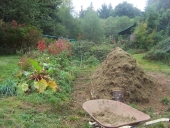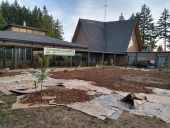
 3
3




When you reach your lowest point, you are open to the greatest change.
-Avatar Aang
 5
5




If you fail to plan, you plan to fail. -B. Franklin
 3
3




 1
1




If you fail to plan, you plan to fail. -B. Franklin
 4
4




Living a life that requires no vacation.




When you reach your lowest point, you are open to the greatest change.
-Avatar Aang




Our inability to change everything should not stop us from changing what we can.




T.J. Stewart wrote:The USDA actually does have grant opportunities for Non Profits, it just depends on what you are trying to do.




When you reach your lowest point, you are open to the greatest change.
-Avatar Aang

 2
2




Our inability to change everything should not stop us from changing what we can.
 2
2




 1
1




Support Ant Village Lot Efforts On Narrow Pond
Respect your superiors...if you have any. Mark Twain




Orin Raichart wrote:Hello James,
There are three things I hope you will consider once you get your grants.
Firstly, I'm hoping you also plan a small processing/preserving building too for every garden/food forest you plan. I've noticed much food from community gardens, public bushes, and public trees going to waste. One method I like is to dry everything: a solar dehydrator the size found on this site here would do the job for you.
Secondly, you'll need a lot of containers to store the dry food in: my small garden took up a great deal of food storage space once dried. A small building and large solar dehydrator will help actually keep the food from being wasted on the ground. The small building would hold the dried food canisters inside for later distribution.
Thirdly, you'll need to package the food so that the users (homeless and others who are hungry) actually want to eat the food. Sounds strange but, the homeless are not really into canned corn or canned green beans as I've noticed when I've volunteered in food banks. A homeless person/hungry person who has no means is going to look at a full ripe squash and think, " What am I going to do with this??? I don't have a stove or a refrigerator and it'll make big mess which I don't have the water to clean the mess up with.....heck, it will make a mess outta me!!!"
But if you plan the food combinations before you plant the food forest/garden products, then you can distribute the dried food in tasty combinations: sunflower seeds, butter nut squash, and dried banannas are one idea. Another idea is kale chips dipped in chillis.
A dried package, like a dried shell of of some sort, say a dried hollow gourd so you don't have to buy plastic or paper bags, filled with things tasty dried items, removes all the issues a homeless person /hungry poor person may have with garden food. Now the person can hold it in one hand and use the other hand to dip and eat...... and the "bag" isn't going to add to the general trash of the neighborhood...it'll decompose.
Harvest time could be a large church gathering to process the food to be dried. Once dried, a a certain number of hollow gourds could be filled (or maybe dried food wrapped in large leaves...possibly small baskets make from the squash vine), and the rest stored for later food gourd making parties.
Without these steps, a great deal of food will be lost (which I see quite frequently).
Good luck and let us know what you develop.
When you reach your lowest point, you are open to the greatest change.
-Avatar Aang





Our inability to change everything should not stop us from changing what we can.





Our inability to change everything should not stop us from changing what we can.

| I agree. Here's the link: http://stoves2.com |


